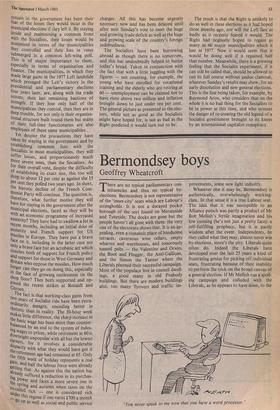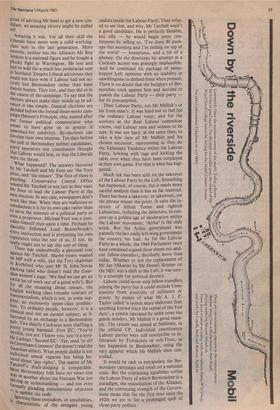Bermondsey boys
Geoffrey Wheatcroft
There are no typical parliamentary con- stituencies and thus no typical by- elections. Bermondsey is not representative of the 'inner-city' seats which are Labour's strongholds. It is not a decayed pocket borough of the sort found on Merseyside and Tyneside. The docks are gone but the people haven't all gone with them: the very size of the electorate shows that. It is an ap- pealing, even a romantic place of handsome terraces, cavernous wine cellars, empty wharves and warehouses, and sonorously named pubs — the Valentine and Orson, the Boot and Flogger, the Anti-Gallican, and the Simon the Tanner where the Liberals planned their successful campaign. Most of the populace live in council dwell- ings, a good many in old Peabody buildings. But there are modern buildings also, too many flyovers and traffic im-
provements, some new light industry.
Whatever else it may be, Bermondsey is authentically, overwhelmingly working- class. In that sense it is a true Labour seat. The idea that it was susceptible to an Alliance putsch was partly a product of Mr Bob Mellish's fertile imagination and his low cunning (he's not just a pretty face): a self-fulfilling prophecy, but it is partly wisdom after the event. Independents, be they called what they may, almost never win by-elections, more's the pity. Liberals quite often do. Indeed the Liberals have developed over the last 25 years a kind of frustrating genius for picking off individual seats, frustrating because of their inability to perform the trick on the broad canvas of a general election. If Mr Mellish ran a spoil- ing campaign and colluded with the Liberals, as he appears to have done, to the
'You never speak to me now that you have a word processor.'
Point of advising Mr Steel to get a new con- didate, an amazing victory might be pulled off.
Amazing it was. For all their skill the Liberals have never won a solid working- class seat in the last generation. More recently, neither has the Affiance; Mr Roy Jenkins is a national figure and he fought a Plucky fight at Warrington. He lost and had to wait for a much less proletarian seat in Scotland. Despite Liberal adroitness they could not have won if Labour had not ac- tively lost Bermondsey rather than been merely beaten. They lost, and they did so in the course of the campaign. To say that the electors always make their minds up in ad- vance is too simple. General elections are decided before the formal three-weeks cam- paign (Mount's Principle, this, named after our former political commentator who seems to have gone on to greater if unwished-for celebrity). By-elections can develop their own impetus. Ten days before the poll at Bermondsey neither candidates, Party operators nor constituents thought
that Labour would lose, or that the Liberals were the threat.
What happened? The answers favoured by Mr Tatchell and Mr Foot are 'the Tory Press, and 'the smears'. The first of these is Puzzling. Conservative Central Office wanted Mr Tatchell to win just as they want Mr Foot to lead the Labour Party at the next election. In any case, newspapers don't work like that. When they are malicious or mendacious it is for its own sake rather than to serve the interests of a political party or even a proprietor. Michael Foot was a jour- nalist himself once upon a time. Perhaps he slavishly followed Lord Beaverbrook's every instruction and is projecting his own experience onto the rest of us. If not, he really ought not to say this sort of thing. There was undoubtedly a personal vote against Mr Tatchell. Maybe voters wanted an MP with a wife, like the Tory chairman in Rochford who sent Mr St John-Stevas Packing (and who doesn't read the Guar- Women's page: 'We find we can get an awful lot of work out of a good wife'). But for all the moaning about smears, the _English working class remains tolerant of nomosexualism, which is not, as some sup- Pose, an exclusively upper-class predilec- tion. To ordinary people, however, it is a _comical and not an earnest subject, as il- lustrated by an exchange in a Bermondsey Pub. Two elderly Cockneys were chaffing a Pretty young barmaid. First EC: 'You're terrible, you are. I know you, you're a terri- ble Lesbian.' Second EC: 'Yer, send 'er off to Greenham Common' (he doesn't read the .Guardian either). What people dislike is not individual sexual vagaries but being lec- tured about 'gay rights'. The matter of Mr T. atchell's draft-dodging is comparable. .1‘inst Bermondsey folk have no views one Skiving or another about the Vietnam War but k wing or scrimshanking — and not even formally pleading conscientious objection is against the code. 15 ignoring these prejudices, or sensibilities, characteristic of the arrogant young
zealots inside the Labour Party. They refus- ed to see that, and why, Mr Tatchell wasn't a good candidate. He is perfectly likeable, but silly — he would begin press con- ferences by telling us, 'I've done 30 push- ups this morning and I'm feeling on top of the world' — bumptious, and a bit of a phoney. On the doorsteps his attempt at a Cockney accent was gratingly implausible. And he combined his package of teeny- bopper Left opinions with an inability or unwillingness to defend them when pressed. There is no doubt that the burghers of Ber- mondsey took against him and decided to punish the Labour Party — their party — for its presumption.
Their Labour Party, not Mr Mellish's or his front man's. It was hard not to feel for the ordinary Labour voter, and for the workers at the Real Labour committee rooms, real Labour men and women to be sure. It was not hard, at the same time, to take a low view of Mr Mellish and his chosen successor, representing as they do the Tammany Tendency within the Labour Party, howling with rage and kicking the table over when they have been outplayed at their own game. For that is what has hap- pened.
Much ink has been spilt on the takeover of the Labour Party by the Left. Something has happened, of course, but it needs more careful analysis than it has so far received. There has been a takeover, or takeovers, yet the phrase misses the point. It suits the in- terests of leftish Tories and rigNish Labourites, including the defectors, to con- jure up a golden age of moderation within the Labour movement; 'Attlee' is the code word. But the Attlee government was patently the last really left-wing government the country has had. As for the Labour Party as a whole, the 1945 Parliament must have contained a good three dozen out-and- out fellow-travellers, decidedly more than today. Whether or not the replacement of Mr Ian Mikardo by Mr Dennis Skinner on the NEC was a shift to the Left, it was sure- ly a triumph for political decency. Labour could never stop fellow-travellers joining the party but it could exclude Com- munists from positions of influence or power, by means of what Mr A. J. P. Taylor called 'a system more elaborate than anything known since the repeal of the Test Acts', a system operated by some none too gentle minders. Mr Mellish is a good exam- ple. The system was aimed at Stalinists, at the official CP. Individual constituency Labour parties were still susceptible to in- filtration by Trotskyists or sub-Trots, as has happened in Bermondsey, using the very apparat which Mr Mellish once con- trolled.
It would be rash to extrapolate the Ber- mondsey campaign and result on a national scale. But the continuing squabbles within the Labour Party of which Bermondsey is a paradigm, the resuscitation of the Alliance, and the continuing strength of the Govern- ment mean that for the first time since the 1920s we are in for a prolonged spell of three-party politics.















































 Previous page
Previous page